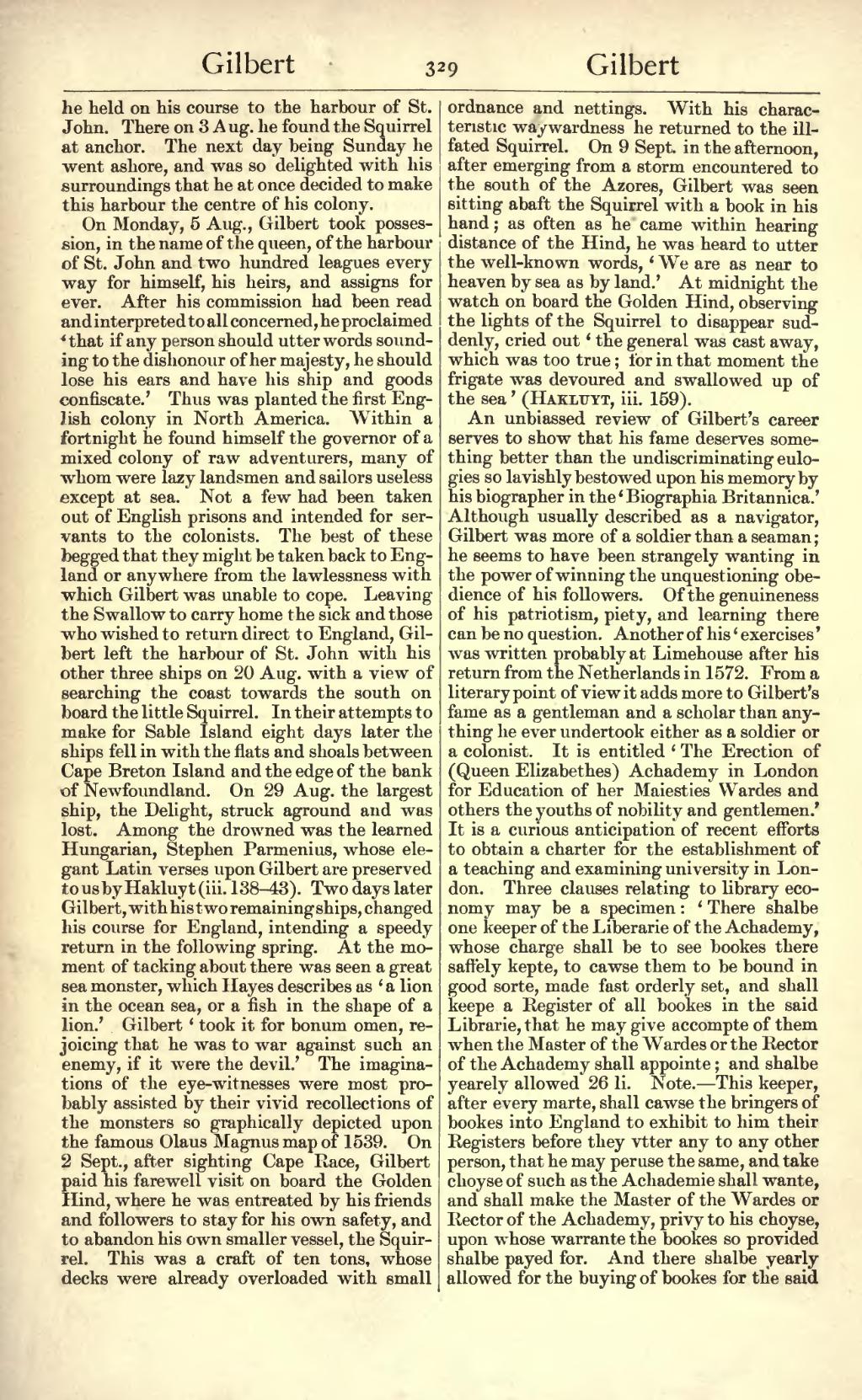he held on his course to the harbour of St. John. There on 3 Aug. he found the Squirrel at anchor. The next day being Sunday he went ashore, and was so delighted with his surroundings that he at once decided to make this harbour the centre of his colony.
On Monday, 5 Aug., Gilbert took possession, in the name of the queen, of the harbour of St. John and two hundred leagues every way for himself, his heirs, and assigns for ever. After his commission had been read and interpreted to all concerned, he proclaimed ‘that if any person should utter words sounding to the dishonour of her majesty, he should lose his ears and have his ship and goods confiscate.’ Thus was planted the first English colony in North America. Within a fortnight he found himself the governor of a mixed colony of raw adventurers, many of whom were lazy landsmen and sailors useless except at sea. Not a few had been taken out of English prisons and intended for servants to the colonists. The best of these begged that they might be taken back to England or anywhere from the lawlessness with which Gilbert was unable to cope. Leaving the Swallow to carry home the sick and those who wished to return direct to England, Gilbert left the harbour of St. John with his other three ships on 20 Aug. with a view of searching the coast towards the south on board the little Squirrel. In their attempts to make for Sable Island eight days later the ships fell in with the flats and shoals between Cape Breton Island and the edge of the bank of Newfoundland. On 29 Aug. the largest ship, the Delight, struck aground and was lost. Among the drowned was the learned Hungarian, Stephen Parmenius, whose elegant Latin verses upon Gilbert are preserved to us by Hakluyt (iii. 138–43). Two days later Gilbert, with his two remaining ships, changed his course for England, intending a speedy return in the following spring. At the moment of tacking about there was seen a great sea monster, which Hayes describes as ‘a lion in the ocean sea, or a fish in the shape of a lion.’ Gilbert ‘took it for bonum omen, rejoicing that he was to war against such an enemy, if it were the devil.’ The imaginations of the eye-witnesses were most probably assisted by their vivid recollections of the monsters so graphically depicted upon the famous Olaus Magnus map of 1539. On 2 Sept., after sighting Cape Race, Gilbert paid his farewell visit on board the Golden Hind, where he was entreated by his friends and followers to stay for his own safety, and to abandon his own smaller vessel, the Squirrel. This was a craft of ten tons, whose decks were already overloaded with small ordnance and nettings. With his characteristic waywardness he returned to the ill-fated Squirrel. On 9 Sept. in the afternoon, after emerging from a storm encountered to the south of the Azores, Gilbert was seen sitting abaft the Squirrel with a book in his hand; as often as he came within hearing distance of the Hind, he was heard to utter the well-known words, ‘We are as near to heaven by sea as by land.’ At midnight the watch on board the Golden Hind, observing the lights of the Squirrel to disappear suddenly, cried out ‘the general was cast away, which was too true; for in that moment the frigate was devoured and swallowed up of the sea’ (Hakluyt, iii. 159).
An unbiassed review of Gilbert's career serves to show that his fame deserves something better than the undiscriminating eulogies so lavishly bestowed upon his memory by his biographer in the ‘Biographia Britannica.’ Although usually described as a navigator, Gilbert was more of a soldier than a seaman; he seems to have been strangely wanting in the power of winning the unquestioning obedience of his followers. Of the genuineness of his patriotism, piety, and learning there can be no question. Another of his ‘exercises’ was written probably at Limehouse after his return from the Netherlands in 1572. From a literary point of view it adds more to Gilbert's fame as a gentleman and a scholar than anything he ever undertook either as a soldier or a colonist. It is entitled ‘The Erection of (Queen Elizabethes) Achademy in London for Education of her Maiesties Wardes and others the youths of nobility and gentlemen.’ It is a curious anticipation of recent efforts to obtain a charter for the establishment of a teaching and examining university in London. Three clauses relating to library economy may be a specimen: ‘ There shalbe one keeper of the Liberarie of the Achademy, whose charge shall be to see bookes there saffely kepte, to cawse them to be bound in good sorte, made fast orderly set, and shall keepe a Register of all bookes in the said Librarie, that he may give accompte of them when the Master of the Wardes or the Rector of the Achademy shall appointe; and shalbe yearely allowed 26 li. Note.—This keeper, after every marte, shall cawse the bringers of bookes into England to exhibit to him their Registers before they vtter any to any other person, that he may peruse the same, and take choyse of such as the Achademie shall wante, and shall make the Master of the Wardes or Rector of the Achademy, privy to his choyse, upon whose warrante the bookes so provided shalbe payed for. And there shalbe yearly allowed for the buying of bookes for the said
